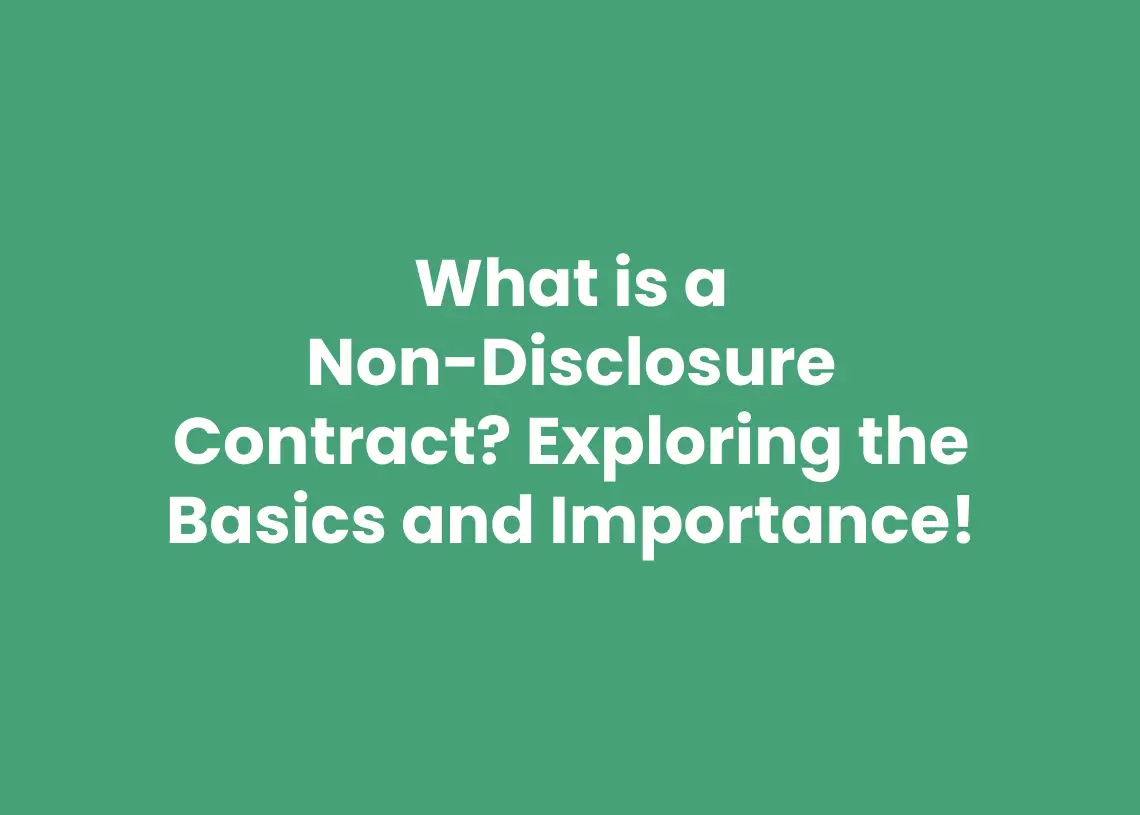Non-disclosure agreements (NDAs) are common legal contracts used in various industries to protect sensitive information. These contracts are commonly used between businesses, employees, contractors, and other parties to safeguard confidential information.
NDAs are legally binding agreements that prohibit the recipient from disclosing any information without the consent of the disclosing party. In today’s fast-paced and competitive business world, NDAs have become a crucial tool in protecting valuable trade secrets, business plans, client information, and other confidential data.
This blog post aims to explore the basics of non-disclosure contracts and their importance in various industries. We will delve into the different types of NDAs and their applications, including mutual NDAs, one-way NDAs, and multilateral NDAs.
Moreover, we will discuss some key clauses that are commonly included in NDAs, such as the definition of confidential information, the term of the agreement, and the consequences of a breach. Additionally, we will highlight some of the most common mistakes made when drafting NDAs.
Earn a certificate in your dream career for an affordable price at IAP Career College today!
Definition: Non-Disclosure Agreement (NDA)
A Non-Disclosure Agreement (NDA), also known as a confidentiality agreement, is a legally binding contract that establishes a confidential relationship between two or more parties. In this agreement, the parties agree to keep certain information confidential and not to disclose it to third parties without authorization.
The information covered by a NDA can range from trade secrets, business plans, financial information, customer lists, and any other confidential information that is essential to the operation of a business or the success of a project.
NDAs are commonly used in business and legal settings to protect sensitive information and prevent unauthorized disclosure, theft, or misuse. It is important to note that a NDA cannot be used to conceal illegal activities, and any confidential information obtained through illegal means is not protected under the agreement.
Types of Information Protected
A non-disclosure contract, or NDA, is a legally binding agreement between two or more parties that outlines confidential information that must not be shared with unauthorized individuals or entities. The types of information protected by an NDA can vary widely, but typically include trade secrets, intellectual property, proprietary data, financial information, customer or client information, and other sensitive business information.
In some cases, the NDA may also specify the duration of the confidentiality obligation, detailing how long the protected information must remain confidential. By clearly defining the types of information that are protected by an NDA, the parties involved can ensure that they are on the same page when it comes to safeguarding sensitive data.
Parties Involved in NDA
A non-disclosure agreement (NDA) is a legal document that aims to protect confidential information shared between parties. It is important to understand the parties involved in an NDA to ensure its effectiveness. Typically, there are three parties involved in an NDA: the disclosing party, the receiving party, and any authorized representatives.
The disclosing party is the person or organization that shares confidential information with the receiving party. The receiving party is the person or organization that receives the confidential information. Authorized representatives are individuals who are authorized to receive or disclose confidential information on behalf of their respective parties. All parties involved in an NDA must agree to the terms and conditions before any confidential information is shared.
Duration of NDA
The duration of a non-disclosure agreement (NDA) is a critical component that defines the period of time for which the parties are bound to maintain confidentiality. This clause specifies the start and end date of the NDA, which can vary depending on the nature of the information being shared.
The duration of an NDA may be for a set period, such as one year or five years, or it may continue indefinitely. It is important to carefully consider the duration of the NDA during the drafting process to ensure that the parties are adequately protected.
A longer duration may be necessary for highly sensitive information, while a shorter duration may be sufficient for less critical information. Ultimately, the duration of the NDA should strike a balance between providing adequate protection for the disclosing party and allowing the receiving party to conduct their business activities without unnecessary restrictions.
Circumstances that Trigger NDA
A non-disclosure agreement (NDA) is a legally binding document that prohibits one or more parties from sharing confidential information with unauthorized individuals or entities. There are various circumstances that can trigger the need for an NDA.
These include but are not limited to, discussions related to new product launches, mergers and acquisitions, hiring of key employees, and negotiations with vendors or suppliers. In addition, any situation that requires the disclosure of sensitive business information, such as financial data, marketing strategies, or customer lists, may also require an NDA.
It is important to note that the circumstances that trigger an NDA will vary depending on the nature of the business and the types of information that need to be protected. Regardless of the situation, NDAs are critical in safeguarding a company’s intellectual property, maintaining a competitive edge, and ensuring that confidential information does not fall into the wrong hands.
Legal Enforceability of NDA
The legal enforceability of a non-disclosure agreement (NDA) is a crucial aspect to consider when drafting and executing such a contract. An NDA is a legally binding document that outlines the confidentiality terms between two or more parties.
In order for an NDA to be legally enforceable, it must meet certain requirements, such as being in writing, clearly defining the confidential information, and specifying the time frame for which the agreement is valid. Additionally, both parties must agree to the terms of the NDA and sign the document.
It is important to consult with a legal professional when creating an NDA to ensure that it meets all necessary legal requirements and can be enforced in court if necessary. Failing to do so can result in the loss of valuable trade secrets or other confidential information. Ultimately, the legal enforceability of an NDA is vital to protecting the interests of all parties involved.
Importance of NDA in Business
A non-disclosure agreement (NDA) is a legal document that outlines the terms and conditions of confidential information shared between two parties. It is an essential tool for protecting sensitive information and intellectual property in various business transactions, including partnerships, joint ventures, and mergers and acquisitions.
The importance of NDA in business cannot be overstated, especially in today’s digital age, where information can spread rapidly and easily. By signing an NDA, both parties commit to protecting each other’s confidential information and preventing unauthorized access or disclosure.
It provides a legal recourse if one party breaches the agreement, giving the other party the right to seek damages and other remedies. Overall, NDA is a critical component of any business deal that involves confidential information and is an effective way to safeguard valuable assets and maintain trust between parties.
Situations Where NDA is Required
Non-Disclosure Agreements (NDAs) are legal contracts that are designed to protect sensitive and confidential information from being disclosed to unauthorized parties. NDAs are commonly used in a variety of situations where confidential information is shared between two or more parties. Here are eight situations where an NDA may be required:
- When sharing proprietary information with potential investors or buyers
- When disclosing trade secrets to employees or contractors
- When working with third-party vendors who need access to sensitive data
- When collaborating with partners on a joint project
- When discussing business strategies with consultants or advisors
- When sharing sensitive information with potential business partners or clients
- When disclosing technical information to manufacturers or suppliers
- When discussing sensitive financial information with accountants or auditors.
In each of these scenarios, signing an NDA ensures that the confidential information remains protected and that the parties involved are held to a legally-binding agreement. NDAs help to safeguard a company’s intellectual property and confidential information, which can be crucial to its success and competitive advantage.
Creating an Effective NDA
Creating an effective non-disclosure agreement (NDA) is essential for businesses looking to safeguard their confidential information. An NDA is a legal contract between two parties that outlines the terms and conditions of sharing sensitive information.
The agreement is designed to protect against the unauthorized disclosure of confidential information, trade secrets, or intellectual property. To create an effective NDA, it is important to clearly define the confidential information being shared, the purpose of sharing the information, and the duration of the agreement.
Additionally, the agreement should include provisions for how the information can be used, who has access to it, and what happens in the event of a breach. It is also important to have both parties sign the NDA to ensure mutual understanding and agreement. By taking the time to create an effective NDA, businesses can safeguard their confidential information and protect themselves from potential legal disputes.
Seeking Legal Advice before Signing
Seeking legal advice before signing a non-disclosure contract is a crucial step that should not be overlooked. While NDAs are intended to protect your confidential information, the terms and conditions of the agreement can be complex and nuanced.
A qualified attorney can help you understand the legal implications of the contract and ensure that your interests are adequately protected. They can also advise you on any potential risks and liabilities associated with signing the NDA, and negotiate more favorable terms if necessary. In short, consulting a legal professional before signing a non-disclosure contract can save you time, money, and potential legal issues down the line.
Conclusion: What is a Non-Disclosure Contract?
In conclusion, a non-disclosure contract is a crucial legal agreement that protects confidential information. It is a tool that businesses and individuals can use to guard their valuable ideas, trade secrets, and other sensitive information.
The importance of a non-disclosure agreement cannot be overstated, especially in today’s fast-paced business world where competition is intense. By understanding the basics of non-disclosure contracts and the importance they hold, individuals and organizations can take a proactive approach to safeguarding their confidential information and protect their intellectual property.




